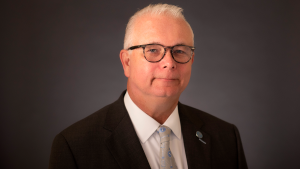Chairman Boliek’s Remarks

Boliek is an attorney and partner with Williford, Crenshaw, Boliek and Frangakis LLP in Fayetteville. His practice focuses on litigation and consults on healthcare issues, specifically those in the allied health field. Previously, he spent several years as an award-winning journalist, political consultant and public relations professional. Boliek also previously served as CEO of a government contracting firm and as a prosecutor in Cumberland County.
Good morning. Welcome to the March regular meeting of the UNC-Chapel Hill Board of Trustees.
Carolina continues to be a national leader.
Yesterday, the Board of Trustees, the Chancellor and many in this room had the honor of attending the ribbon cutting that signified the opening of the North Carolina Collaboratory’s home here on campus in the Kenan Labs building. We were honored to host the President Pro Tem of the N.C. Senate, Phil Berger, who brought congratulations from the legislature.
The work that Dr. Jeff Warren has done with the Collaboratory is yet another example of how we are leading the nation at UNC-Chapel Hill. The idea of the Collaboratory was to leverage the research engine of North Carolina’s universities to inform policymakers, to improve the lives of North Carolinians, and ultimately to make the world a better place.
I was honored to be allowed to give brief remarks and was reminded that when the Collaboratory was first proposed in the N.C. legislature, media accounts said, and I quote, “the creation of the Collaboratory was prompting concern among environmentalists and faculty who fear political pressure will get in the way of sound science.”
Those fears were unfounded. And after the Legislature’s continued confidence in Dr. Warren’s team and its confidence in the University of North Carolina at Chapel Hill, the Collaboratory has supported projects and research at universities across the state. Research into areas that include COVID-19 and its effects, chemical contamination in water, and energy resources again are solving the problems of our time. The Collaboratory was an idea that now is a game-changer.
With that in mind, this Board supported the idea of a School of Civic Life and Leadership at our January meeting. Nearly identical criticism that arose at the thought of the Collaboratory has surfaced again from the same sources at the idea that Carolina can be a leader in civil discourse and in teaching today’s students the skills of communication, debate, and understanding.
Ideas that make a difference come from many places. They don’t always come from one source, and I’m proud that at Carolina – as our Chancellor often says – we are the most public of public universities.
Therefore, it should not surprise anyone that this Board, which has actively pushed to make Carolina the greatest university in the world, would support the idea of following through on the prior commitment to take the Program for Public Discourse’s modeling of civil discourse to the classroom. It’s an idea that should be fully developed through all appropriate processes, and it’s an idea that not only will be a model for the nation, but an idea that will shape and foster future leaders of North Carolina, the nation, and the world.
The Board discussed yesterday and is poised today to express its support for the UNC System Board of Governors’ policy against compelled speech on campus. A university is not a place of indoctrination – it’s a place of enlightenment where open debate and ideas are synthesized to produce smart leaders and ideas that positively affect our state, nation, and the world.
Last night, the Board also had the opportunity to spend some time with Dean Raul Reis – a member of the faculty whom this Board approved – at the Journalism School’s new Curtis Media Center. If you have not had the opportunity to visit that facility on campus, it is worth a visit. It exemplifies the very essence of a modern experiential learning facility. I recall at my first or second Board meeting approving the final design of the building and now, in less than four years, the facility is a learning environment that’s producing graduates who are shaping how news and information are delivered.
It was invigorating being able to spend time with Dean Reis, who talked to several of us at his end of the table about how he came to the United States from a town in the Amazon rainforest by way of a Rotary Scholarship. He stayed to become a leader in the field of journalism, and is, of course, now the dean of our Journalism School, of which I am a graduate.
We will continue to pursue civil discourse. Civil discourse doesn’t mean you always agree. It doesn’t mean there aren’t tough questions, and sometimes difficult answers. But it means that everyone has the chance to speak to an issue, contribute, and be accepted with respect.
I’ll close on another issue and say that we as a Board and a University remain committed to improving and supporting the mental health of our students, our faculty, and staff. Yesterday – and I want to thank Trustee Jones – we also heard from a spectrum of faith leaders on campus who are making a difference in students’ lives. We expect to hear from more in coming meetings. The strong mental health of our campus community requires effort from all of us.
At lunch yesterday, we heard a powerful testimony from Coach Mack Brown about a former football player who now comes back to talk to players. It was Coach Brown and his wife Sally’s open ears that changed that young person’s life.
So, if you’re a professor, a staff member, a student, a coach, or even a trustee, have an open ear and show a willingness to help someone. You never really know the effect you can have on a person’s life.
